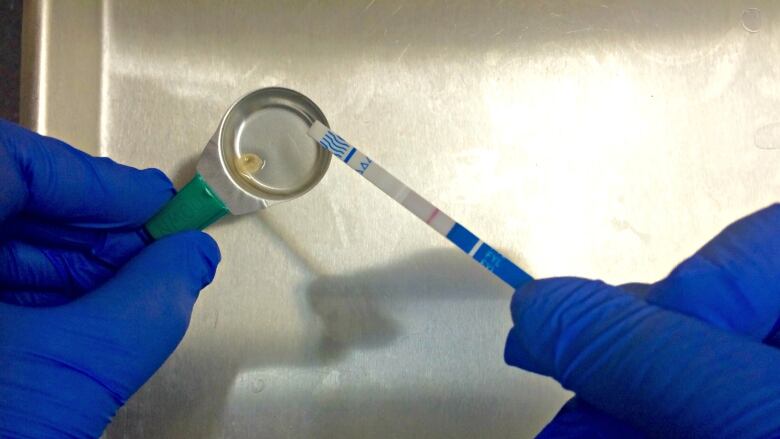A new drug-checking pilot in Calgary could help prevent deaths as overdoses hit record highs
Organizers of the federally-funded strategy say the free service is a necessary prevention tool

Alberta recorded its deadliest year on record for deaths caused by drug overdoses in 2021,the majority of which were linked to opioids.
Now, organizers behind a new pilot program in Calgary say their service could help prevent further fatalities among drug users faced with an increasingly contaminated supply.
Alberta Alliance Who Educate and Advocate Responsibly (AAWEAR), an advocacy organization representing people with experience of banned substance use, announced Sunday that it received federal funding to begin work on a mobile drug-checking service in Calgary.
Kathleen Larose, executive director of AAWEAR, said the plan is to operate the service out of a van at different sites across the city. Users would then be able to voluntarily submit samples of drugs to be tested for toxic substances, such as fentanyl.
Users would be given the choice of whether or not to consume the drugs after seeing the test results.
"This is one more way that people can really regain agency over what they're consuming and open up options for themselves," said Euan Thomson, executive director for EACH+EVERY: Businesses for Harm Reduction, which has partnered withAAWEAR.
Larose emphasized that both people addicted to substances and recreational users would have access to the service.
"We're seeing a lot more [recreational users] here in Alberta," said Larose.
"We have to ask ourselves, is this an addiction issue or can you put in measures and toolsto overall prevent this issue from continuing?"
Mirroring similar projects
The project will be modelled around other drug-checking services already in action across the country, from Victoria to Montreal, said Larose.
While the pilot will take place in Calgary, Larose said the ultimate goal is to establish a framework that could be implemented throughout the province.
"This is not uncharted territory lots of countries do drug checking now as a free service to the public," said Thomson.
"This is absolutely something that we should have done years ago, and it's just nice to see it coming to Alberta finally."
Some drug-checking services share test result data collected by a machine which analyzes the full spectrum of ingredients in a sample and their quantities with safe consumption sites to try to alert users of contaminated strains ahead of time.
One program out of Victoria even posts weekly reports of its test results to Twitter.
Our weekly report is out for the week of April 17th showing results from our #drugchecking project in Victoria, BC (#yyj).
To learn more about our project and to access our monthly and yearly reports, please visit https://t.co/BhtrFtNfp9 #bcpoli #safesupplyNOW #harmreduction pic.twitter.com/yZEF5sHTjY
—@SubstanceUVic"If we could check all drugs at a higher level upstream, then this could yield a potential 67 per centincrease in drug poisoning prevention," said Larose.
In addition to acting as a prevention and recovery tool, Thomson said the project could, in the long run, save the province money in health-care spending.
"Every single drug poisoning costs an average of $1,600 on average in downstream hospital fees," said Thomson.
"So if we can reduce the number of overdoses and poisonings happening at the street level, that means there's less EMS deployment. It means there's less emergency visits overnight, stays at hospitals. Every single one of those things is going to reduce the cost to the public sector."
Next steps underway
In order for the pilot to become operational, it needs a health exemption from the Public Health Agency of Canada for the handling of illicit substances.
Larose said they are currently working on that application, and if all goes well, they should be able to move forward with the project later this summer.
One of the draws of rolling out the program as a mobile drug-checking service is sidestepping certain policies that permanent sites require,such as "good neighbour" agreements, said Thomson.
"The federal government is so keen to see this move forward and the municipality is so keen to see this move forward, I think it would just serve everybody's interest."
With files from Helen Pike












_(720p).jpg)


 OFFICIAL HD MUSIC VIDEO.jpg)
.jpg)



























































































